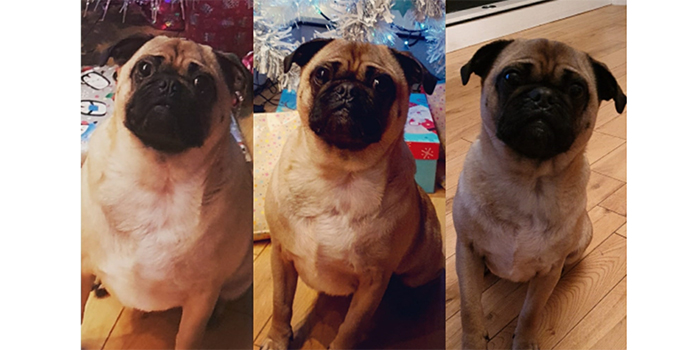The University of Liverpool’s Royal Canin Weight Management Clinic is celebrating its 15th birthday. Since it was opened in 2005, the clinic has helped almost 500 cats and dogs to shed almost two tonnes of their body weight.
The pet obesity clinic, which is based at the University’s Small Animal Teaching Hospital, was the first of its kind in Europe.
Ollie the pug (pictured) is one of the clinic’s most recent success stories. On average, pets managed through the clinic lose 20% of their body weight.
Despite the challenges of lockdown, Ollie has exceeded all expectations and shed over a third of his body weight in just 10 months. He is now just 500g from his target weight and is unrecognisable from his former self.
His owner, Mr Glascott of Wigan, Greater Manchester said: “Before Ollie would spend much of his day sleeping, whereas now he loves playtime and exercise and runs during walks, which is a first! He now loves being active and can keep up during playtime with children or on longer walks off the lead.
“Ollie’s breathing is now perfect – even during hotter weather – and his allergies are also completely under control. We are incredibly grateful to the clinic for supporting us and helping Ollie lose 5.4kg, which has made him feel so much better and healthier.”
The clinic has helped almost 70 different breeds of dogs to lose weight, but the breeds that are referred to them most often are: Labrador, Cavalier King Charles Spaniel, Cross breeds, Pug, Golden Retriever, Border Collie, Dachshund, Yorkshire Terrier, Bulldog and Cocker Spaniel.
Alex German, Royal Canin Professor of Small Animal Medicine, said, “Over the last 15 years, we have learnt a lot about obesity in dogs and cats – what causes it, the health problems it brings and how best to manage it.
“We are delighted at how our insights have helped veterinary professionals to achieve success in managing obesity in the pets that they care for. However, above all we have loved sharing the journeys of the many pets and owners in reaching their goals and seeing for ourselves the improvements in quality of life that this brings.”


